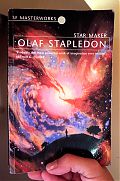
Olaf Stapledon
Star Maker
I brought Star Maker for reading on my recent visit to the States, thinking that its cosmological meanderings might pair well with my physical own. But the journey was prematurely aborted by those pleasant (sic) people at Homeland Security, leaving me only with this philosophical companion. And Olaf Stapledon proved to be good company—though Simon would have been better—for he jettisoned me out to outer space.
Olaf Stapledon (what a name!) wrote Star Maker between the two world wars, after serving as an ambulance driver in the first one. There were times in the book when I imagined him trying to come to grasp with that experience, trying to convince his way out of that death-filled futility, watching the world escalate to new horrors. There are men like Blaise Cendrars who accept that violence and then there are men like Stapledon and Dostoevsky who must work it out for themselves.
Stapledon begins his book by placing his nameless narrator on a hill near his house to think. He sees a light on in his house, where his wife and kids are, and he sees the light of the stars.
Even the cold stars, even the whole cosmos with all its inane immensities could not convince me that this our prized atom of community, imperfect as it was, short-lived as it must be, was not significant.
From this idea, that humans are capable of a close and insular “community” despite our varied faults, the narrator leaves his hill to fly or drift or project himself through space.
I perceived I was on a little round grain of rock and metal, filmed with water and with air, whirling in sunlight and darkness. And on the skin of that little grain all the swarms of men, generation by generation, had lived in labour and blindness, with intermittent joy and intermittent lucidity of spirit. And all their history, with its folk-wanderings, its empires, its philosophies, its proud sciences, its social revolutions, its increasing hunger for community, was but a flicker in one day of the lives of the stars.
The narrator travels through space, encountering all sorts of things and places and “people,” as gradually more and more of the cosmos are revealed to him as his consciousness wakens. At first he is only able to make mental contact with those planets undergoing the familiar crisis of Earth, which in turn provides a more heightened vision for the facets of the cosmos he can see. Layer by layer he journeys through Stapledon’s imagined stages to the ultimate Supreme Moment of the cosmos where he is able to come face to face with the Star Maker: he sees cosmos and cosmos through the cold eye of the creator, the beginning and the end of all things.
Reading Star Maker was a journey, an immensely imaginative one. It is a direct attempt to answer that most basic question, “What are we doing here? What is the point to all this, this beauty and this destruction?” It’s a book that shouldn’t be taken lightly and will surely reap more insight during subsequent readings. It is a powerful book and deeply poetic as if in response to its subject, the cosmos; it is philosophical without being too ambiguous or preachy. Reading it is to stimulate the imagination, not only to what might be “out there” but also, and most importantly, what is here on Earth.
· · · · · · · · · · · · · · · · · · · ·